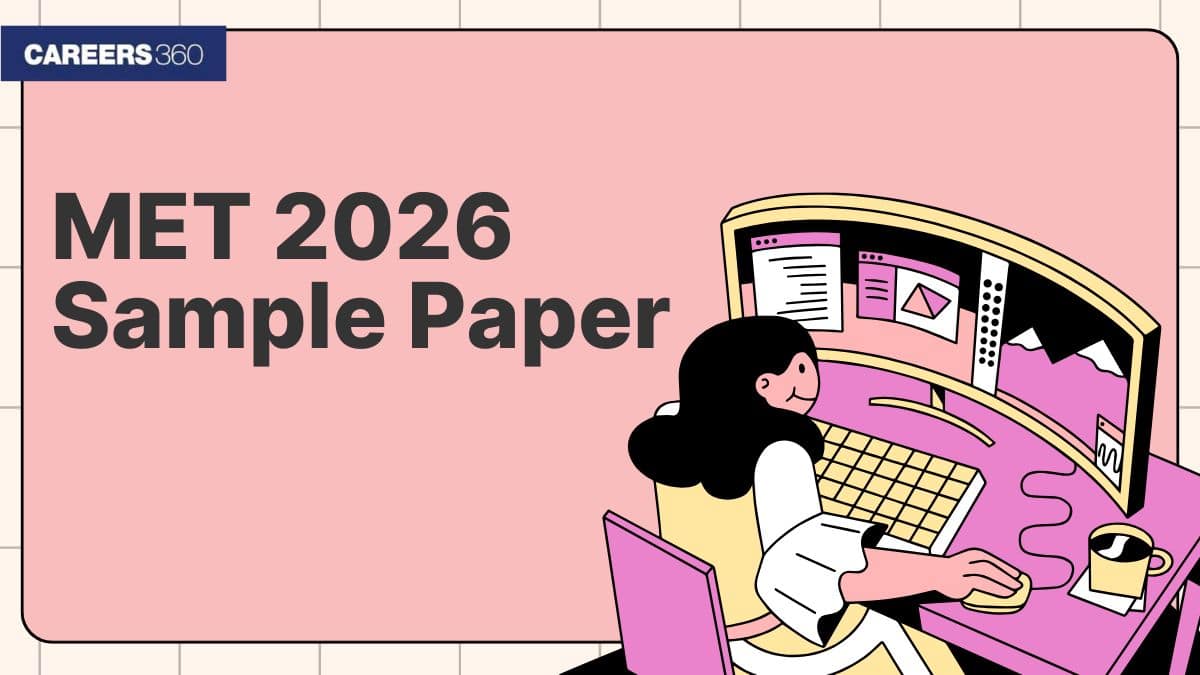MET Sample Papers With Solutions 2026 PDF - Download Previous Year Question Papers
MET 2026 Sample Paper: Candidates can check the MET sample paper 2026 on this page. Practice past MET question papers helps candidates understand the exam pattern and the types of questions commonly asked. By practising with these sample papers, students can boost their confidence, refine their strategies, and enhance their performance, making them better equipped to tackle MET 2026 with success. Preparing for MET 2026 requires a thorough understanding of the syllabus, the exam pattern, the types of questions, and time management skills. Solving the Manipal entrance test previous year papers pdf will boost the preparation and also help to understand the difficulty level of the paper. The authority will conduct the MET 2026 exam in two session.
This Story also Contains
- MET Sample Papers 2026
- MET 2026 Question Paper
- Benefits of Practising with MET Sample Papers
- MET 2026 Exam Pattern

MET Sample Papers 2026
The authority will release the MET 2026 sample paper on the official website. Candidates can check the previous year sample paper for MET in the table below.
Download Previous Year MET Sample Papers PDF
MET Sample Paper PDF |
| MET Sample Paper |
MET 2026 Question Paper
The authority will release the MET 2026 Question Paper on the official website. Meanwhile, candidates can access previous papers on this page. Aspiring candidates for MET 2026 can benefit from reviewing question papers from previous years, including 2025, 2024, 2023, 2022, and 2021. These papers offer valuable insights into the exam pattern and question types, aiding in effective preparation for the upcoming MET 2026 examination.
Related links:
Benefits of Practising with MET Sample Papers
Go through the advantages of practising sample papers of MET 2026.
Practising more Manipal 2026 sample papers with solutions will help the candidates understand the level and type of questions asked in the entrance test.
Candidates will be able to find weak and strong areas by solving the MET previous year papers and analyzing their performance regularly.
Using the mock test of MET 2026 will also help the candidates to know frequently asked questions & topics.
By practising met previous year papers, candidates will improve their self-confidence, speed, accuracy & efficiency, and time management.
Practicing more MET sample papers 2026 also eliminates exam fear among the students.
MET 2026 Exam Pattern
The authorities will release the Manipal Entrance Test pattern 2026 along with the release of the official brochure. The MET exam pattern 2026 will include details like the mode of the exam, the total number of questions, the marking scheme, and the number of sections. Candidates can refer to the table below to check the exam pattern of MET 2026.
MET Exam Pattern 2026
Particulars | Details |
Examination mode | Computer-Based Test |
Examination duration | 2 Hours |
Language | English |
Questions type | Objective type Multiple Choice Questions (MCQs) and numerical Answer Type (NAT) |
Sections | Chemistry - 10 MCQs & 5 NAT Physics - 10 MCQs & 5 NAT Mathematics - 15 MCQs & 5 NAT English & General Aptitude - 10 MCQs only |
Total number of questions | 30 Questions |
Total marks | 240 marks |
Marking scheme | MCQs & NAT, Four marks will be awarded for every correct answer |
Negative marking | One mark will be reduced for every wrong answer. No negative marking for NAT. |
Frequently Asked Questions (FAQs)
MET sample papers are based on the actual pattern of the Manipal Entrance Test exam. Thus, it helps candidates boost their preparation.
MET 2026 will be a Computer-Based Test in online mode.
The Manipal exam will conduct the MET exam for 120 minutes.
The MET mock test pattern is similar to the entrance examination. The total duration of the mock test is 2 hours and the candidates will have to answer 60 Multiple Choice Questions (MCQ) and Numerical Answer Type NAT Questions. No extra time will be provided to the candidates in the mock test. For every correct answer, 4 marks will be allotted. There is no negative marking in Numerical Answer Type Questions, however, for Multiple Choice Questions, 1 mark will be deducted for every wrong answer.
Popular Courses and Specializations
List of colleges accepting MET
Browse Engineering Colleges by State
Questions related to MET
On Question asked by student community
Hello,
SET and MET both have MCQ questions. The link to the question paper is attached here. You can download the question paper of both exams, and practising the papers can help you improve your performance.
https://university.careers360.com/exams/set
https://engineering.careers360.com/download/met-sample-papers-previous-years?sort=latest
Thank you
The 2025 met exam question papers with answer keys are available on the Careers360 website.They upload model papers and exam-related updates which are helpful for practice.
https://engineering.careers360.com/articles/met-2025-questions-paper-solutions
Hello dear candidate,
expected registration dates for MET exam 2026 are as follows:-
- application opens:- September/October 2025
- last date:- last week of march 2026
for more details you can visit the link given below:-
https://engineering.careers360.com/download/ebooks/met-exam-pattern-and-syllabus
Hello dear candidate,
YES, You have good percentile for NT-B category at MET Bhujbal , Nashik pharmacy as the past cut off usually were between 63% and 80%, so you ft in that range but your merit number is quite high so it is a bit difficult it early rounds,
Yes, you can get admission in MET Bhujbal Nashik for Pharm D if you meet the required cut-off percentile in MHT CET. Usually the cut-off for Pharm D at this college goes quite high, so your admission depends on your percentile, merit rank and category. If you score above the
